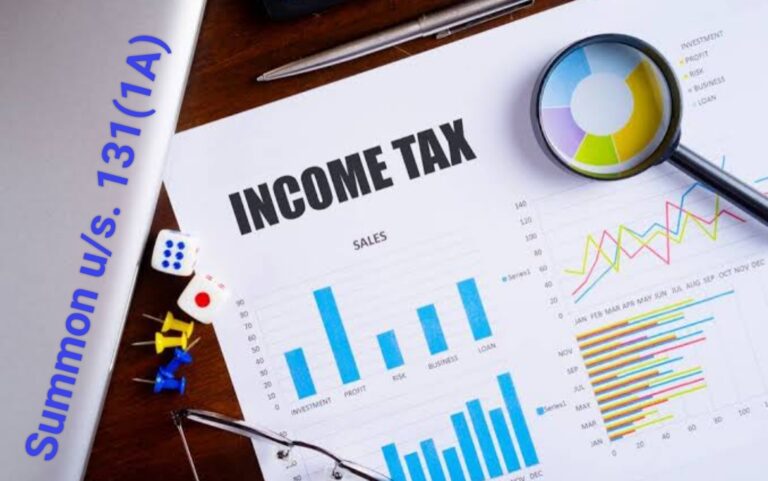Summons under Section 131(1A) typically issued when the I-T Department suspects concealment of income or requires further inquiry before proceeding with search and seizure.
Section 131(1A) of the Income Tax Act, 1961 empowers assessing officers with specific authority to issue summons, even when no formal proceedings are pending. This provision grants tax officers additional power in cases where further investigation is required to ensure compliance with tax laws.
Also Read: Delhi High Court Rules on Fee for Technical Services (FTS) Under Section 9(1)(vii) of Income Tax Act
Understanding Section 131(1A) Summons
The issuance of a summons under Section 131(1A) typically occurs when the Income Tax Department suspects concealment of income or requires further inquiry before proceeding with search and seizure actions under Section 132.
Key Points About Section 131(1A) Summons
- The recipient of the summons is often not provided with complete details regarding the purpose of the investigation.
- The summons can be issued even if no formal proceedings are pending against the individual.
- It serves as a tool for tax authorities to gather necessary financial information.
Situations Leading to Issuance of Summons Under Section 131(1A)
The Income Tax Department may issue a summons under the following circumstances:
- Before initiating a search & seizure operation under clauses (i) to (v) of Section 132.
- Suspected concealment of income by an individual or entity.
- Without any ongoing tax proceedings, if the tax officer deems it necessary for investigation.
Rights of the Assessee
Individuals receiving a summons under Section 131(1A) have certain legal rights:
- Fair Treatment: The person summoned must be treated fairly and should not be subjected to undue pressure or harassment.
- Right to Legal Representation: The assessee has the right to seek legal assistance and be represented by a professional or legal counsel.
- Right to Appeal: If the summons is deemed unfair or unjustified, the assessee has the right to appeal against it.
How to Respond to a Summons Under Section 131(1A)?
Receiving an income tax notice can be intimidating, but responding promptly and correctly is crucial to avoid penalties. Here’s how to handle it efficiently:
Steps to Respond to a Summons Under Section 131(1A)
- Understand the Notice: Carefully review the notice to identify the reason behind the summons, which may involve undisclosed income or financial transactions.
- Electronic Submission of Documents: If the notice requests proof of financial transactions, such as property purchases, submit the necessary documents electronically.
- Physical Appearance: If required, appear before the tax authorities in person or appoint an Authorized Representative (AR) to represent you.
- Timely Document Submission: Provide all requested documents within the deadline. If any documents are missing, seek an extension from the Assessing Officer (AO).
Also Read: Section 131- Power Regarding Discovery, Production Of Evidence, Etc
Link Between Section 131(1A) and Civil Procedure Code
Section 131(1A) aligns with the Civil Procedure Code (CPC), granting tax authorities the power to:
- Enforce an individual’s attendance for inquiry.
- Demand discovery and inspection of assets or documents.
- Conduct an oath-based examination of the taxpayer.
Implications of Section 131(1A) Summons
- Enhanced Cooperation Between Law Enforcement Agencies
- Enables effective collaboration between various agencies to combat tax evasion and financial fraud.
- Protection of Confidential Information
- Ensures that confidential taxpayer data is safeguarded against unauthorized disclosure.
- Faster & More Efficient Investigations
- Helps streamline investigations, making them more effective in uncovering undisclosed income.
- Strengthening Measures Against Tax Evasion
- Acts as a deterrent by increasing the risk of detection and legal consequences for tax evaders.
Conclusion
Receiving a notice under Section 131(1A) of the Income Tax Act is common, and there is no need to panic. Ensure that you respond promptly, provide all necessary documents, and seek professional tax assistance if required. Consulting a tax expert can help you navigate the process efficiently and avoid penalties or legal complications.
For expert assistance, consult a tax professional who can guide you through the response process and ensure compliance with tax laws.
READ MORE
Understanding Section 62 of the CGST Act, 2017: Assessment of Non-Filers of GST Returns
Andhra Pradesh High Court Rules Against GST Notice Delay: Two-Day Lapse Cannot Be Condoned
Delhi High Court Clarifies: Quashing of One Issue in SCN Doesn’t Nullify Other Demands
